|
|
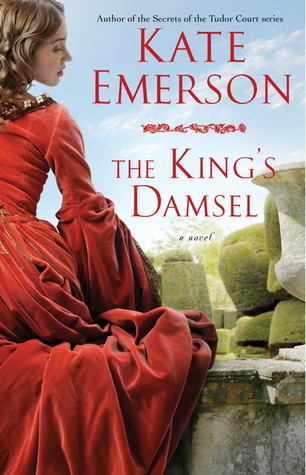 Young Tamsin Lodge, heiress, is sent from the arms of her loving stepmother into the tumultuous world of the Tudor court as a teenager. She quickly realizes that her best option to progress in life is not to mourn for what she’s lost, but to seize the opportunity to gain the influence of powerful people. Her guardian places her as a lady of honor to Princess Mary, who Tamsin grows to love, but as the dynamics of power at court shift, Tamsin has to choose her loyalties carefully and decide what’s best for herself, her family, and her kingdom. Young Tamsin Lodge, heiress, is sent from the arms of her loving stepmother into the tumultuous world of the Tudor court as a teenager. She quickly realizes that her best option to progress in life is not to mourn for what she’s lost, but to seize the opportunity to gain the influence of powerful people. Her guardian places her as a lady of honor to Princess Mary, who Tamsin grows to love, but as the dynamics of power at court shift, Tamsin has to choose her loyalties carefully and decide what’s best for herself, her family, and her kingdom.
The King’s Damsel is a book that should appeal immensely to fans of historical fiction. It’s a richly written, intriguing story of a fictional girl trying to make her way best through a very hostile Tudor court. She’s hampered by her own ignorance, due to her upbringing, but she’s earnest and she tries hard to make a difference. She encounters a huge number of genuine historical figures and indeed has some basis in historical fact. Unfortunately, it was not a book that I personally enjoyed very much, due to three reasons.
The first, which is most certainly not the book’s fault, is that I still haven’t recovered any sort of desire to read fiction about the Tudor court. I overdid this years ago and it seems the desire to actually read these books has not come back. There are a few works of historical fiction which have risen above this, but I didn’t find this to be one of them.
The second is the fact that the back cover gives away practically all of the story, which I’ve actually omitted from my own summary above. I really dislike when this happens; a crucial plot point in the last third of the book really shouldn’t be on the back cover. I’m guessing someone, somewhere thought the book wouldn’t be as appealing to potential readers without this detail, but I spent most of the first 2/3 of the book waiting for that to happen.
The third reason is that I didn’t really get on board with the romance, which seemed too cursory and unrealistic given the actual status of the people involved. I wasn’t really convinced by it, and it didn’t help much that the book skipped years with mostly not much happening. I understand that maybe much didn’t happen, but it didn’t help power the book along at all, and it was a little hard to imagine how a romance happened if the key figures only saw each other once a year. A year is a long time.
The book is only 300 or so pages long and took me 5 days to read, which for me kind of demonstrates how disinterested I was in it. A lot of that probably isn’t the book’s fault – looking elsewhere, it’s had pretty good reviews. It is likely that this book, and this series, might suit someone who is still keen on Tudor historical fiction. But that someone isn’t me.
I received this book for free for review.
 I really enjoyed 22 Britannia Road, so I was particularly pleased when Spilt Milk arrived on my doorstep. In this historical novel, sisters Rose, Vivian, and Nellie vow to be spinsters forever. Rose has raised the much younger Vivian and Nellie since the death of their parents when both girls were small. When she passes away in 1913, much too early, the girls are lost without her, with no notion of how to care for themselves. As a result, one of them manages to make a mistake that drives a wedge in their relationship forever, even after they’ve seemingly reconciled. Years later, Nellie’s daughter Birdie returns to her mother’s town, looking for elements of her own past. Will she uncover the secrets that Nellie and Vivian left behind and expose the potentially disastrous mistakes of their youth? I really enjoyed 22 Britannia Road, so I was particularly pleased when Spilt Milk arrived on my doorstep. In this historical novel, sisters Rose, Vivian, and Nellie vow to be spinsters forever. Rose has raised the much younger Vivian and Nellie since the death of their parents when both girls were small. When she passes away in 1913, much too early, the girls are lost without her, with no notion of how to care for themselves. As a result, one of them manages to make a mistake that drives a wedge in their relationship forever, even after they’ve seemingly reconciled. Years later, Nellie’s daughter Birdie returns to her mother’s town, looking for elements of her own past. Will she uncover the secrets that Nellie and Vivian left behind and expose the potentially disastrous mistakes of their youth?
Ignorance never does anyone any favours, and the sisters in Spilt Milk, along with their sole offspring, suffer from this very lapse. Because no one ever really tells them about what’s in the world, and their education is limited, with all of the girls instead mistakenly assuming they’ll remain spinsters all their lives, they aren’t sure how to handle themselves when things don’t go to plan. And so they make mistakes – and they’re not the first women to do so. In the early twentieth century, innocence seems to go hand-in-hand with ignorance. Rose makes the mistake of never telling Vivian and Nellie about men, instead trying to get them both to stay with her. When a man shows up, of course, they both act in a way that may have been prevented, if only they’d known.
The entire book spools out from the consequences of that ignorance and misunderstanding. It’s no surprise that, when Nellie then goes out into the world, what she learns helps her make a more successful life for herself, avoiding her sister’s mistakes and any particularly damaging ones of her own. As time goes on, the specter of the secret diminishes, because standards are quickly changing, through both World Wars as the sisters age. What was once a disaster becomes something just slightly scandalous and by the end of the book no big deal.
I quite liked this book; it put an interesting perspective on the relationships between sisters, mothers, and daughters. The complex relationships between Vivian and Nellie, then Nellie and Birdie, are often truly moving. I wasn’t sure what I wanted each of the women to discover, but I knew I wanted to experience it through the eyes of each of the women. Practical but still loving Nellie was my favorite of them, I think – she is the one who goes out into the world, and she is the one who has the bravery eventually to seize more of her life, rather than letting it happen to her. But my heart broke for all of the women at various times as they change and grow and the results of their choices impact every aspect of their lives.
Spilt Milk would be a great read for a fan of women’s fiction who is tempted to try out something historical. Highly recommended.
All external book links are affiliate links. I received this book for free for review.
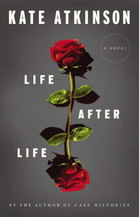 On a cold winter day in 1910, Ursula is born. Again. And again. And again. Every time Ursula dies, she is born again, and given the chance to live her life anew. But Ursula has no way of knowing this, only a vague recollection of events that have previously happened and a dread of what she did or didn’t do in previous lives. As she lives her life over and over, experiencing the lead-up to World War II and a whole range of different outcomes to her life, we start to wonder: can Ursula change history? On a cold winter day in 1910, Ursula is born. Again. And again. And again. Every time Ursula dies, she is born again, and given the chance to live her life anew. But Ursula has no way of knowing this, only a vague recollection of events that have previously happened and a dread of what she did or didn’t do in previous lives. As she lives her life over and over, experiencing the lead-up to World War II and a whole range of different outcomes to her life, we start to wonder: can Ursula change history?
I really enjoyed this book. I am a huge fan of so-called “quiet” books and though some of the events in this one are more explosive, this is at its heart a book about chances. The smallest actions of Ursula’s change the entire trajectory of her life. As we go back to that February day in 1910, we start to see the entire picture of what was happening that day, for instance; while some readers might get bored by the fact that we go through that day each and every time Ursula dies, I loved how it let Kate Atkinson build up the entire scene, through all the supporting characters, and finally leave us with something still to think about at the end of the book.
It also has the advantage of being set in a fascinating period of British history, spanning both World Wars over the course of its length. While it’s tethered to the world we know, the reincarnation aspect allows Atkinson to explore what might have happened if – and this is at the heart of the book. What happens when Ursula stands up for herself is completely different to what happens when Ursula is simply unable to do that. One of the most heartbreaking episodes in the book, when Ursula’s life turns out to be devastating, is through something that is not her fault in the slightest but completely destroys her self-worth and confidence. And, of course, she blames herself, and the guilt and blame imposed by that sole event change the course of her life. It’s also one of the most problematic, because she manages to subvert and avoid that very event next time, but as ordinary women without her sense of foreboding, we can’t hope for the same.
I also loved the World War II sections; I think many readers will agree that there’s just something about the London blitz which, horrifying as it was, is almost guaranteed fascinating reading. In Ursula’s situation there are simply so many different outcomes and the book’s structure allows Atkinson to explore each and every one. Regardless if Ursula dies or Ursula lives, anything could happen to anyone she loves. It’s not a wonderful situation, but it made for wonderful reading, and Atkinson pulls off the reincarnation trick over and over.
When I purchased this book, I read it almost immediately; I’d heard a lot of hype and I simply wanted to read it for myself. After doing so, I’m pleased that it lived up to all of that and more. I’d happily recommend – and will be recommending – this book, and I’ll certainly be going straight for the rest of the Kate Atkinson on my TBR pile.
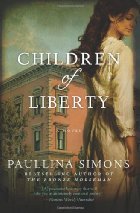 Gina Attaviano is a fourteen-year-old Italian immigrant girl living her father’s dream when she and her mother and brother arrive in Boston. Their father Alessandro has passed away, but the rest of the family arrive to stay with a cousin and aunt in Lawrence, Massachusetts. They arrive in Boston Harbor and meet two surprisingly helpful locals, Ben Shaw and Harry Barrington, who lend them an apartment for the night. Both are from prominent families, but that doesn’t stop them getting involved with the Attaviano family; Ben immediately becomes infatuated with fourteen-year-old Gina, while Gina herself develops a massive crush on Harry, who remains aloof. Over the course of the novel, determined Gina decides to find a way to fit herself in Boston society, having discovered what she truly longs to have. Gina Attaviano is a fourteen-year-old Italian immigrant girl living her father’s dream when she and her mother and brother arrive in Boston. Their father Alessandro has passed away, but the rest of the family arrive to stay with a cousin and aunt in Lawrence, Massachusetts. They arrive in Boston Harbor and meet two surprisingly helpful locals, Ben Shaw and Harry Barrington, who lend them an apartment for the night. Both are from prominent families, but that doesn’t stop them getting involved with the Attaviano family; Ben immediately becomes infatuated with fourteen-year-old Gina, while Gina herself develops a massive crush on Harry, who remains aloof. Over the course of the novel, determined Gina decides to find a way to fit herself in Boston society, having discovered what she truly longs to have.
I’ve never read any of Paullina Simons’s books before and I have a feeling that I chose the wrong place to start. I was deeply underwhelmed by this book, having heard many good things about the author’s Bronze Horseman trilogy, and I’m now not sure I’m curious enough about what happens next to actually delve into that trilogy. I read this first as I got it for review and a prequel is generally not a bad place to start reading a series, but I think I should have started with Simons’s other books.
Let me explain why. First of all, the characters were simply not people I wanted to spend time with. Gina decides to go off and do her own thing, lying to everyone who loves her, from the minute she steps foot on American soil. She refuses to listen to any sort of logic and, in short, behaves like a reckless teenager. That’s fine – that’s what she is for most of the book anyway. But she also turns out to be a character who is impossibly perfect; she excels at school when she decides she should, she earns all sorts of mysterious extra money with her cleverness and makes herself beautiful clothes, she begs a loan to start her family’s restaurants, and every man who sees her falls at her feet, except of course Harry (until he finally does). She even somehow speaks perfect English, even though she admits in the beginning of the book that she hadn’t paid as much attention to her father’s lessons as she should have.
Harry, on the other hand, is an adult, but seems like he could have happily remained a child or student forever. He ignores all sense of responsibility and lets his life happen to him, rather than doing anything at all to influence it himself. He’s content enough, it seems, to be in a relationship with a well-bred girl he doesn’t love, to flounder about wondering what he’s supposed to be doing while continuing to study (and getting nowhere doing it), and living off his father’s money well into his twenties. Ben, his best friend, was far more interesting because he actually had a spine and went off and did things himself. When Harry finally makes a decision about his life, he hides it from everyone and creates a disaster. Twice.
Second, the book has little plot. Gina decides she’s in love with Harry and the rest of the book is spent on various conversations, political talks and meetings, and her often fruitless efforts to entice him. I felt zero spark between them, even when Harry finally wakes up and realizes that a gorgeous Italian woman has him firmly on a leash. The romance part of the book felt dreamlike and I had no real sense of why these two people had chosen to be together. It’s one of those attraction-and-nothing-else storylines which get on my nerves.
Lastly, much of the book is spent on little happening but talking. I’m normally fine with this and tend to even enjoy “quiet” books, generally because they have some sort of meaning. But here? Gina’s entire existence is focused around Harry; everything she’s done, everything she’s learned, has simply been to attract a man. So her ideals seem faked, while Harry hides from his life and ignores responsibility, spouting nonsense about what he believes in and failing to act on any of it. I just got fed up with them and with the book – after writing this review I’m actually surprised that I finished it.
The Bronze Horseman might be worth reading, but I’m not sure Children of Liberty is. If you’re interested, I’d recommend visiting your library first. That’s where I’ll be getting the rest of the trilogy from, if I decide to continue.
I received this book for free for review.
 When Juliet Montague’s husband George leaves her, she’s trapped in a cycle of Jewish not-quite-widowhood. She can’t divorce him without his presence, as under Jewish law the man must divorce his wife, but until he dies, assuming she knows about it, she can’t marry or really even look at another Jewish man. In the conservative Jewish community of her parents, she’s just not treated in the same way as other women, made worse by the fact that she’s spent seven years as a single mother putting practicalities ahead of her artistic nature. When she turns thirty and goes out to buy a refrigerator, which she’s dutifully saved towards, she is instead captivated by an artist on the street who asks to paint her picture for the same cost. Juliet falls into a world of artists in 1960’s London, enriching her life immeasurably. When Juliet Montague’s husband George leaves her, she’s trapped in a cycle of Jewish not-quite-widowhood. She can’t divorce him without his presence, as under Jewish law the man must divorce his wife, but until he dies, assuming she knows about it, she can’t marry or really even look at another Jewish man. In the conservative Jewish community of her parents, she’s just not treated in the same way as other women, made worse by the fact that she’s spent seven years as a single mother putting practicalities ahead of her artistic nature. When she turns thirty and goes out to buy a refrigerator, which she’s dutifully saved towards, she is instead captivated by an artist on the street who asks to paint her picture for the same cost. Juliet falls into a world of artists in 1960’s London, enriching her life immeasurably.
What this book is really about is how Juliet finds herself – still loving her children as much as ever, but redeeming her own identity as a person. She lost it so easily when her husband left simply because she had to. When she meets the artist, Charles Fussell, she remembers what she felt before she’d met George and regains a part of herself that she lost with him. Through meeting other artists, and eventually embarking on a love affair, she begins to re-discover who she is. This is cleverly symbolized by the fact that each artist she meets tends to paint her, capturing little bits of Juliets throughout her life.
It’s easy to relate to Juliet as a character. She’s not quite a pariah, but she is ostracized all the same. Her parents love her, as she loves her children, but she doesn’t fit in. It’s uncomfortable for her but it’s excruciating in some ways for her children, Frieda and Leonard. They are mocked by the other children for their mother’s status and because they’ve lost their father. Their eventually paths in life diverge but reflect how that struggle helps to form their futures. Frieda becomes a very traditional, strict Jew herself in the vein of her grandparents, while Leonard embraces his mother’s artistic leanings wholeheartedly.
As for Juliet, she does seem to find pieces of herself as she goes along. I got the feeling that wife and motherhood swept her away and her identity was lost to a degree in the search of promoting other people’s happiness. It becomes clear fairly early on why she started hiding pieces of herself away, but when George leaves she simply can’t gain the freedom that might have helped her on that journey sooner.
I’d probably only say that this book was a little bit slow; I actually read the whole book in one day, but split up by several other things. I never really felt glued to the page and I would have been able to set it aside for longer if I’d had to. It’s more of a contemplative book, rather than one with a fast-moving plot.
I enjoyed The Gallery of Vanished Husbands, but I didn’t love it quite as much as I did Mr Rosenblum’s List. I’ll definitely continue looking out for future books by this author, though. She has a lot of potential and she writes beautifully, with compelling characters. Recommended.
All external book links are affiliate links. I received this book for free for review.
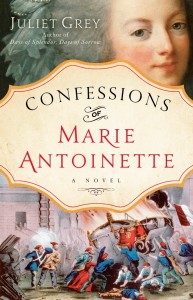 The revolutionaries are taking France over. Before Marie Antoinette realizes it, they’ve invaded her home and threatened the lives of her family and loved ones. Marie Antoinette herself is reviled as a foreign, an inconsiderate woman who has no discrimination about who she sleeps with or why. She must be the cause of all the wrongs that the people have experienced and they are calling for her head. The Revolution is right at the gates of Versailles and the once-loved King and Queen of France become, somehow, enemies of the people, prisoners of the state, their lives hanging by fragile threads. The revolutionaries are taking France over. Before Marie Antoinette realizes it, they’ve invaded her home and threatened the lives of her family and loved ones. Marie Antoinette herself is reviled as a foreign, an inconsiderate woman who has no discrimination about who she sleeps with or why. She must be the cause of all the wrongs that the people have experienced and they are calling for her head. The Revolution is right at the gates of Versailles and the once-loved King and Queen of France become, somehow, enemies of the people, prisoners of the state, their lives hanging by fragile threads.
This story was never going to end well. Everyone who has even the remotest familiarity with French history knows the fate of Louis XVI and Marie Antoinette. An author who isn’t writing an alternate history knows the ending. Still, though, after spending this whole trilogy with Marie Antoinette, the final volume of her story is heart-breaking. I can’t begin to imagine how it must have felt for the author, and the many people who choose this tragic woman as their subject, once the final page is written.
Despite the inevitable ending and the gradually more desperate tone of the book, Confessions of Marie Antoinette is a book that continued the excellence of the rest of the trilogy and concluded it in a way that is perfectly appropriate to Marie Antoinette’s story. The book is not without its moments. I thought personally one of the most touching was the way in which their immediate family was drawn closer together, towards the middle of the book. In captivity, stripped of the trappings of royalty, the “Capets” become a small, surprisingly loving nuclear family. They’re weathering a crisis together and it does indeed bring them together.
Somehow this makes the rest of the book all the sadder.
Grey navigates the confusing environment of the French Revolution deftly. It would be easy to get bogged down in politics, but she always manages to keep a central focus on Marie Antoinette and her family. While there is necessarily an element of telling, not showing, owing to the fact that Marie Antoinette spends a lot of the book away from the action, I never felt like the story slowed to accommodate it.
Instead, Grey uses a second viewpoint character, Louison, to give us an idea of the revolutionary feeling. I think Louison is intended to show how the citizens could get so caught up in revolutionary fervor that they let a minority commit truly radical acts. I never really connected with her, though, maybe because I was too busy feeling for the royal family.
I would definitely recommend this trilogy of books to anyone who is interested in reading excellent fiction about Marie Antoinette. As the conclusion, Confessions of Marie Antoinette is just as good as the previous two books by Juliet Grey, perfect for historical fiction lovers.
I read this book as part of the Historical Fiction Virtual Book Tour. For more viewpoints, check out the tour schedule.
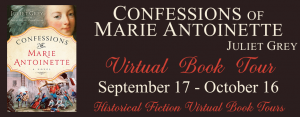
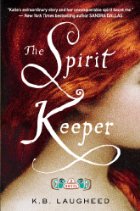 Katie O’Toole is the unlucky thirteenth child of Irish immigrants, living in the wilds of Pennsylvania, when Native Americans attack her small town and kill many of her family. Katie, however, with her flaming red hair and bright blue eyes, is hailed by one of the natives as the subject of his vision. Instead of being harmed, she is treated as precious and given the “choice” of going along with two natives – both of a different clan than the attackers – or staying with her family and being ransomed back to her family. For Katie this requires almost no thought, as she’s spent her life in unappreciated semi-servitude to her parents and siblings, but she vastly underestimates the difficulties that face her as she and her two new companions make their way west. Katie O’Toole is the unlucky thirteenth child of Irish immigrants, living in the wilds of Pennsylvania, when Native Americans attack her small town and kill many of her family. Katie, however, with her flaming red hair and bright blue eyes, is hailed by one of the natives as the subject of his vision. Instead of being harmed, she is treated as precious and given the “choice” of going along with two natives – both of a different clan than the attackers – or staying with her family and being ransomed back to her family. For Katie this requires almost no thought, as she’s spent her life in unappreciated semi-servitude to her parents and siblings, but she vastly underestimates the difficulties that face her as she and her two new companions make their way west.
I was genuinely surprised by how very much I enjoyed this book. The description sounded enticing, but I tried to go into it with no expectations in case it didn’t work out the way that I hoped. Instead, it far surpassed my expectations. This ended up being a delightful book that still manages to handle some very serious and important concerns.
First of all, racism. The early American colonists were very, very wrong in their treatment of Native Americans, basically claiming every last bit of land in the country that they made up (ignoring previous boundaries and societal organizations). Katie is the sole narrator of this book, but she witnesses prejudices first hand against her companions on numerous occasions. She even makes up her own misconceptions based on that racism, only to have them knocked down and torn apart by the men she’s travelling with. In this case she doesn’t know any better, doesn’t know anything different from what she’s been told. She naively assumes that their expectations of life match her expectations of life and watching that change as she realized that she was dealing with a people completely different from her own was fascinating. If anything it shows how important it is to broaden our horizons and open our minds.
Katie also undergoes a significant period of grief, which I can’t touch on without spoiling the story. But it was a moving experience and really showed how naive she was, despite the hardships of her life before. It’s almost as though, after that complete change, she no longer applies the logic of her previous life to her current life. I really enjoyed Katie as a character overall, actually; I found her easy to relate to and learn along with her about the new world that she finds herself in.
The book is written in a style meant to mimic how a woman of her era would have spoken or written, which I found distracting at first but then basically stopped noticing as I got further into the book. I’m not sure how others would feel about this, but it definitely didn’t get in the way of my appreciation of the book, although I can’t say it added much.
And, of course, The Spirit Keeper has an absolutely wonderful romance with just a touch of fantasy – interpretation left up to the reader mainly. Again, I don’t want to give away any details, but I really loved this aspect of the book. The book only ended too soon – I’d have happily kept on reading for another hundred pages. I look forward to more from K. B. Laugheed in the future.
All external book links are affiliate books. I received this book for free for review.
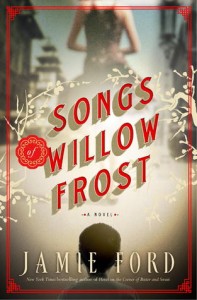 Twelve year old William is an orphan, as far as he knows. From the moment his mother’s limp body was carried away five years ago, he’s been a lost soul at an orphanage in Seattle. He has a few friends, including his blind best friend Charlotte, but he longs for a family. As a Chinese-American, though, his chances for adoption are incredibly slim, and he’s resigned himself to years of the same treatment. On the orphans’ collective, made-up birthday, he’s taken to see a movie. To his shock, William recognizes an actress in the film – his mother! Willow Frost looks and sounds just like the beautiful mother he lost five years ago. William decides that he simply must find her and begins in earnest to seek his family again. Twelve year old William is an orphan, as far as he knows. From the moment his mother’s limp body was carried away five years ago, he’s been a lost soul at an orphanage in Seattle. He has a few friends, including his blind best friend Charlotte, but he longs for a family. As a Chinese-American, though, his chances for adoption are incredibly slim, and he’s resigned himself to years of the same treatment. On the orphans’ collective, made-up birthday, he’s taken to see a movie. To his shock, William recognizes an actress in the film – his mother! Willow Frost looks and sounds just like the beautiful mother he lost five years ago. William decides that he simply must find her and begins in earnest to seek his family again.
A few years ago I read Jamie Ford’s Hotel on the Corner of Bitter and Sweet, a book that I really liked and which I still think about sometimes. I was very much looking forward to this book, so perhaps a bit of disappointment was inevitable. William’s story just didn’t grab me in the same way, nor did the intertwined tale of his mother. The story is actually considerably depressing, as life was for a Chinese woman left mostly to fend for herself as Willow was. I desperately wanted life to improve for her, but as their stories unfolded, William’s place in the orphanage made the outcome clear.
This was still a very beautifully written book, with a number of evocative scenes. I’m honestly not sure why I personally failed to connect with it when I felt so strongly about Ford’s previous book. Looking back on reading it, most of what I remember is rainy, dreary Seattle and the insurmountable hardships that Willow faced throughout her young life, as well as certain plot events around William that I can’t share. I wanted to reach into the book and fix everything for each of the characters, but sadly that isn’t something actually possible.
Would I still recommend that others read this book? I think so. It’s still a telling portrait of the life of Chinese-Americans in the early twentieth century and the difficult lives they faced. It also paints a picture of early Hollywood. Some of the relationships within are very well written, too. My experience doesn’t seem common, but overall I don’t think this was the book for me. Still, if you would enjoy the elements described above, I suspect you would greatly appreciate Songs of Willow Frost.
All external book links are affiliate links. I received this book for free for review.
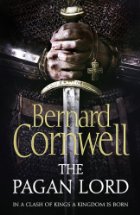 In the seventh installment of Bernard Cornwell’s Warrior Chronicles, Uhtred of Bebbanburg has fallen from the favour of the King of Wessex. Unfortunately, he’s also fallen from the favour of the Mercians. Double dealing drives him from his home and he decides that the time is ripe to take back what is his – Bebbanburg. Leading a small band of loyal retainers north, Uhtred sneaks his way into the home of his ancestors, but capturing what is his may be a goal that eludes him once again. As Danes and Saxons struggle for control of the British isles, where will Uhtred fit in? In the seventh installment of Bernard Cornwell’s Warrior Chronicles, Uhtred of Bebbanburg has fallen from the favour of the King of Wessex. Unfortunately, he’s also fallen from the favour of the Mercians. Double dealing drives him from his home and he decides that the time is ripe to take back what is his – Bebbanburg. Leading a small band of loyal retainers north, Uhtred sneaks his way into the home of his ancestors, but capturing what is his may be a goal that eludes him once again. As Danes and Saxons struggle for control of the British isles, where will Uhtred fit in?
By this point in the series, I feel like I’ve grown to know Uhtred very, very well. He’s aged and grown somewhat wiser through the years of the story; when he remembers his younger years, it’s easy for the reader to remember them, too, through the books. It’s a strange position for a series to be in, because we’re intimately acquainted with all the characters and conflicts, but the author has to keep the series fresh and maintain interest. With six books to get through before this one, new readers may be put off. They shouldn’t be, though – Cornwell’s books are amongst the best historical fiction has to offer on the Anglo-Saxon period and I love seeing the kingdom of England rise through his eyes.
Because really, that’s what these books are about. Uhtred’s personal struggles are certainly there, with his strong desire to retake his home castle of Bebbanburg and to be with the people he loves, but central to each is the fact that there is a huge struggle between Danes and Saxons that clearly is going to come to an end. As this is history, we know that the Anglo-Saxons win the day and create a united England, but Uhtred doesn’t know that. Cornwell is excellent at telling the story as it comes, so that Uhtred makes no assumptions about what is going to happen. Instead, he focuses on his own goals and loyalties, sticking to a personal moral code and to the men who have gained his loyalty over the last few years.
This book remains as solidly enjoyable as the rest of the series. I love following Uhtred’s adventures. He’s such a great character and he’s really well defined. The battle scenes are as vivid as ever, putting readers straight into the middle of the action so that I could almost feel what it would be like to stand in the shield wall. This part of Anglo-Saxon history is one of my favorites and it’s fascinating watching England come together through his eyes. As I was reading this book initially, I wondered how long the series would go on, but at this point I think it really has to continue until England is united, and I hope Uhtred is there to see it happen.
I recommend The Pagan Lord as I would with every installment of the series, but I do recommend starting with The Last Kingdom, the first of Uhtred’s adventures. It will put everything in context.
All external book links are affiliate links. I received this book for free for review.
 In anticipation of the UK release of The Pagan Lord by Bernard Cornwell, the seventh in the Warrior Chronicles, I’ve got an early excerpt to tempt you for publication date on Thursday! Come back tomorrow for my review. In anticipation of the UK release of The Pagan Lord by Bernard Cornwell, the seventh in the Warrior Chronicles, I’ve got an early excerpt to tempt you for publication date on Thursday! Come back tomorrow for my review.
“None of us knew the country, or which way we should go, so I simply followed the Roman road until it joined another that ran north and south. ‘We keep going west,’ I told Finan.
‘Just west?’
‘We’ll find somewhere we know.’
‘Or ride to the world’s end,’ he said happily.
The fog was lifting and the land rose slowly until we reached a rolling upland where there were fat farms and big halls half hidden by groves of good trees, and though I was sure folk saw us, no one came to enquire what brought us to their land. We were armed men, best left alone. I sent scouts ahead as I always did in hostile country, and this land was certainly hostile. We were either in Cnut’s land or Sigurd’s territory and all the halls would be Danish. The scouts rode either side of the road, using woods or hedgerows for cover and always looking for any sign of an enemy, but we met none. Once, on the second day, five horsemen came towards us from the north, but they saw our numbers and veered away.
We were among higher hills by then. The villages were smaller and more scattered, the halls less wealthy. I sent my Danes to purchase ale and food from the halls and the Saxons to buy provisions from the villages, but there was scarce any spare food because so many armed bands had been this way before us. I went to one hall where an old man greeted me. ‘I am Orlyg Orlygson,’ he said proudly.
‘Wulf Ranulfson,’ I responded.
‘I have not heard of you,’ he said, ‘but you’re welcome.’ He limped because of an old wound in his left leg. ‘And where does Wulf Ranulfson ride?’
‘To join Jarl Cnut.’
‘You’re late,’ he said, ‘the summons was for the moon’s death. She’s growing again.’
‘We’ll find him.’
‘I wish I could go,’ Orlyg patted his injured leg, ‘but what use is an old man?’ He looked at my companions. ‘Just seven of you?’
I gestured vaguely northwards. ‘I’ve got three crews on the road.’
‘Three! I can’t feed that many. But I’ll have my steward find you something. Come inside, come inside!’ He wanted to talk. Like all of us, he welcomed travellers if they brought news, and so I sat in his hall and petted his hounds and invented tales about Frisia. I said the harvest there would be poor.
‘Here too!’ Orlyg said gloomily.
‘But there is good news,’ I went on, ‘I heard that Uhtred Uhtredson attacked Bebbanburg and failed.’
‘Not just failed,’ Orlyg said, ‘he was killed there!’ I just stared at him and he grinned at the surprise on my face. ‘You hadn’t heard?’ he asked.
‘Uhtred Uhtredson was killed?’ I could not keep the astonishment from my voice. ‘I heard that he failed,’ I went on, ‘but he survived.’
‘Oh no,’ Orlyg said confidently, ‘he died. The man who told me was a witness to the fight.’ He pushed his fingers into his tangled white beard to touch the hammer at his neck. ‘He was cut down by the Lord Ælfric. Or maybe it was Ælfric’s son. The man wasn’t sure, but it was one of them.’
‘I heard Ælfric died,’ I said.
‘Then it must have been the son who dealt the blow,’ Orlyg said, ‘but it’s true! Uhtred Uhtredson is dead.’
‘That will make Jarl Cnut’s life easier,’ I said.
They all feared Uhtred,’ Orlyg said, ‘and no wonder. He was a warrior!’ He looked wistful for a moment. ‘I saw him once.’
‘You did?’
‘A big man, tall. He carried an iron shield.’
‘I heard that,’ I said. I had never carried an iron shield in my life.
‘He was fearsome, right enough,’ Orlyg said, ‘but a warrior.’
‘He belongs to the Corpse-Ripper now.’
‘Someone should go to the Lord Ælfric,’ Orlyg suggested, ‘and buy the fiend’s corpse.’
‘Why?’
‘To make the skull into a drinking cup, of course! It would make a fine gift for Jarl Cnut.’
‘The jarl will have drinking cups enough,’ I said, ‘when he’s beaten Æthelred and Edward.’
‘And he will,’ Orlyg said enthusiastically. He smiled. ‘At Yule, my friend, we shall all drink from Edward’s skull and dine in Edward’s hall and use Edward’s wife for pleasure!’
‘I heard Jarl Cnut’s wife was captured by Uhtred,’ I said.
‘A rumour, my friend, a rumour. You can’t believe everything you hear. I’ve learned that much over the years. Men come here and give me news and we celebrate it and then discover it isn’t true at all!’ He chuckled.
‘So perhaps Uhtred lives,’ I suggested mischievously.
‘Oh no! That is true, my friend. He was chopped down in battle, and he still lived, so they tied him to a post and loosed the dogs on him. They tore him to bits!’ He shook his head. ‘I’m glad he’s dead, but that’s no way for a warrior to die.’
I watched as servants carried ale, bread and smoked meat to my men waiting in the orchard. ‘To find the jarl,’ I asked Orlyg, ‘we keep going west?’
‘Cross the hills,’ he said, ‘and just follow the road. The jarl won’t be in any of his halls, he’ll have sailed south by now.’
‘To Wessex?’
‘To wherever he wants!’ Orlyg said. ‘But if you follow the road west you’ll come to Cesterfelda and you can ask there.’ He frowned. ‘I think you go from there to Buchestanes and the jarl has a hall there, a fine hall! One of his favourite halls, and there’ll be men in the hall who’ll tell you where to find him.’ “
|
|
 Young Tamsin Lodge, heiress, is sent from the arms of her loving stepmother into the tumultuous world of the Tudor court as a teenager. She quickly realizes that her best option to progress in life is not to mourn for what she’s lost, but to seize the opportunity to gain the influence of powerful people. Her guardian places her as a lady of honor to Princess Mary, who Tamsin grows to love, but as the dynamics of power at court shift, Tamsin has to choose her loyalties carefully and decide what’s best for herself, her family, and her kingdom.
Young Tamsin Lodge, heiress, is sent from the arms of her loving stepmother into the tumultuous world of the Tudor court as a teenager. She quickly realizes that her best option to progress in life is not to mourn for what she’s lost, but to seize the opportunity to gain the influence of powerful people. Her guardian places her as a lady of honor to Princess Mary, who Tamsin grows to love, but as the dynamics of power at court shift, Tamsin has to choose her loyalties carefully and decide what’s best for herself, her family, and her kingdom.

 I really enjoyed
I really enjoyed  On a cold winter day in 1910, Ursula is born. Again. And again. And again. Every time Ursula dies, she is born again, and given the chance to live her life anew. But Ursula has no way of knowing this, only a vague recollection of events that have previously happened and a dread of what she did or didn’t do in previous lives. As she lives her life over and over, experiencing the lead-up to World War II and a whole range of different outcomes to her life, we start to wonder: can Ursula change history?
On a cold winter day in 1910, Ursula is born. Again. And again. And again. Every time Ursula dies, she is born again, and given the chance to live her life anew. But Ursula has no way of knowing this, only a vague recollection of events that have previously happened and a dread of what she did or didn’t do in previous lives. As she lives her life over and over, experiencing the lead-up to World War II and a whole range of different outcomes to her life, we start to wonder: can Ursula change history? Gina Attaviano is a fourteen-year-old Italian immigrant girl living her father’s dream when she and her mother and brother arrive in Boston. Their father Alessandro has passed away, but the rest of the family arrive to stay with a cousin and aunt in Lawrence, Massachusetts. They arrive in Boston Harbor and meet two surprisingly helpful locals, Ben Shaw and Harry Barrington, who lend them an apartment for the night. Both are from prominent families, but that doesn’t stop them getting involved with the Attaviano family; Ben immediately becomes infatuated with fourteen-year-old Gina, while Gina herself develops a massive crush on Harry, who remains aloof. Over the course of the novel, determined Gina decides to find a way to fit herself in Boston society, having discovered what she truly longs to have.
Gina Attaviano is a fourteen-year-old Italian immigrant girl living her father’s dream when she and her mother and brother arrive in Boston. Their father Alessandro has passed away, but the rest of the family arrive to stay with a cousin and aunt in Lawrence, Massachusetts. They arrive in Boston Harbor and meet two surprisingly helpful locals, Ben Shaw and Harry Barrington, who lend them an apartment for the night. Both are from prominent families, but that doesn’t stop them getting involved with the Attaviano family; Ben immediately becomes infatuated with fourteen-year-old Gina, while Gina herself develops a massive crush on Harry, who remains aloof. Over the course of the novel, determined Gina decides to find a way to fit herself in Boston society, having discovered what she truly longs to have. When Juliet Montague’s husband George leaves her, she’s trapped in a cycle of Jewish not-quite-widowhood. She can’t divorce him without his presence, as under Jewish law the man must divorce his wife, but until he dies, assuming she knows about it, she can’t marry or really even look at another Jewish man. In the conservative Jewish community of her parents, she’s just not treated in the same way as other women, made worse by the fact that she’s spent seven years as a single mother putting practicalities ahead of her artistic nature. When she turns thirty and goes out to buy a refrigerator, which she’s dutifully saved towards, she is instead captivated by an artist on the street who asks to paint her picture for the same cost. Juliet falls into a world of artists in 1960’s London, enriching her life immeasurably.
When Juliet Montague’s husband George leaves her, she’s trapped in a cycle of Jewish not-quite-widowhood. She can’t divorce him without his presence, as under Jewish law the man must divorce his wife, but until he dies, assuming she knows about it, she can’t marry or really even look at another Jewish man. In the conservative Jewish community of her parents, she’s just not treated in the same way as other women, made worse by the fact that she’s spent seven years as a single mother putting practicalities ahead of her artistic nature. When she turns thirty and goes out to buy a refrigerator, which she’s dutifully saved towards, she is instead captivated by an artist on the street who asks to paint her picture for the same cost. Juliet falls into a world of artists in 1960’s London, enriching her life immeasurably. The revolutionaries are taking France over. Before Marie Antoinette realizes it, they’ve invaded her home and threatened the lives of her family and loved ones. Marie Antoinette herself is reviled as a foreign, an inconsiderate woman who has no discrimination about who she sleeps with or why. She must be the cause of all the wrongs that the people have experienced and they are calling for her head. The Revolution is right at the gates of Versailles and the once-loved King and Queen of France become, somehow, enemies of the people, prisoners of the state, their lives hanging by fragile threads.
The revolutionaries are taking France over. Before Marie Antoinette realizes it, they’ve invaded her home and threatened the lives of her family and loved ones. Marie Antoinette herself is reviled as a foreign, an inconsiderate woman who has no discrimination about who she sleeps with or why. She must be the cause of all the wrongs that the people have experienced and they are calling for her head. The Revolution is right at the gates of Versailles and the once-loved King and Queen of France become, somehow, enemies of the people, prisoners of the state, their lives hanging by fragile threads.
 Katie O’Toole is the unlucky thirteenth child of Irish immigrants, living in the wilds of Pennsylvania, when Native Americans attack her small town and kill many of her family. Katie, however, with her flaming red hair and bright blue eyes, is hailed by one of the natives as the subject of his vision. Instead of being harmed, she is treated as precious and given the “choice” of going along with two natives – both of a different clan than the attackers – or staying with her family and being ransomed back to her family. For Katie this requires almost no thought, as she’s spent her life in unappreciated semi-servitude to her parents and siblings, but she vastly underestimates the difficulties that face her as she and her two new companions make their way west.
Katie O’Toole is the unlucky thirteenth child of Irish immigrants, living in the wilds of Pennsylvania, when Native Americans attack her small town and kill many of her family. Katie, however, with her flaming red hair and bright blue eyes, is hailed by one of the natives as the subject of his vision. Instead of being harmed, she is treated as precious and given the “choice” of going along with two natives – both of a different clan than the attackers – or staying with her family and being ransomed back to her family. For Katie this requires almost no thought, as she’s spent her life in unappreciated semi-servitude to her parents and siblings, but she vastly underestimates the difficulties that face her as she and her two new companions make their way west. Twelve year old William is an orphan, as far as he knows. From the moment his mother’s limp body was carried away five years ago, he’s been a lost soul at an orphanage in Seattle. He has a few friends, including his blind best friend Charlotte, but he longs for a family. As a Chinese-American, though, his chances for adoption are incredibly slim, and he’s resigned himself to years of the same treatment. On the orphans’ collective, made-up birthday, he’s taken to see a movie. To his shock, William recognizes an actress in the film – his mother! Willow Frost looks and sounds just like the beautiful mother he lost five years ago. William decides that he simply must find her and begins in earnest to seek his family again.
Twelve year old William is an orphan, as far as he knows. From the moment his mother’s limp body was carried away five years ago, he’s been a lost soul at an orphanage in Seattle. He has a few friends, including his blind best friend Charlotte, but he longs for a family. As a Chinese-American, though, his chances for adoption are incredibly slim, and he’s resigned himself to years of the same treatment. On the orphans’ collective, made-up birthday, he’s taken to see a movie. To his shock, William recognizes an actress in the film – his mother! Willow Frost looks and sounds just like the beautiful mother he lost five years ago. William decides that he simply must find her and begins in earnest to seek his family again. In the seventh installment of Bernard Cornwell’s Warrior Chronicles, Uhtred of Bebbanburg has fallen from the favour of the King of Wessex. Unfortunately, he’s also fallen from the favour of the Mercians. Double dealing drives him from his home and he decides that the time is ripe to take back what is his – Bebbanburg. Leading a small band of loyal retainers north, Uhtred sneaks his way into the home of his ancestors, but capturing what is his may be a goal that eludes him once again. As Danes and Saxons struggle for control of the British isles, where will Uhtred fit in?
In the seventh installment of Bernard Cornwell’s Warrior Chronicles, Uhtred of Bebbanburg has fallen from the favour of the King of Wessex. Unfortunately, he’s also fallen from the favour of the Mercians. Double dealing drives him from his home and he decides that the time is ripe to take back what is his – Bebbanburg. Leading a small band of loyal retainers north, Uhtred sneaks his way into the home of his ancestors, but capturing what is his may be a goal that eludes him once again. As Danes and Saxons struggle for control of the British isles, where will Uhtred fit in?






Recent Comments